-
11-25-2022
Populações vulnerabilizadas no contexto da pandemia e crises sanitárias
Revista Brasileira de Enfermagem. 2022;75:e75Suppl201
Abstract
Populações vulnerabilizadas no contexto da pandemia e crises sanitárias
Revista Brasileira de Enfermagem. 2022;75:e75Suppl201
DOI 10.1590/0034-7167.202275Suppl201pt
Views0As condições e os modos de vida da população determinam o processo de saúde e adoecimento de forma diferenciada entre os diversos grupos populacionais. As desigualdades na saúde vêm adquirindo relevância ainda maior na produção de diferentes perfis de doença, em função de recentes e surpreendentes acontecimentos mundiais, como divergências étnico-raciais, religiosas, territoriais, identidade de […]See more -
11-25-2022
Reflexões sobre a ciência em enfermagem gerontológica: possibilidades para o seu caminhar
Revista Brasileira de Enfermagem. 2022;75:e75Suppl401
Abstract
Reflexões sobre a ciência em enfermagem gerontológica: possibilidades para o seu caminhar
Revista Brasileira de Enfermagem. 2022;75:e75Suppl401
DOI 10.1590/0034-7167.202275Suppl401pt
Views0O conhecimento científico em enfermagem gerontológica brasileiro tem seus primórdios há mais de 50 anos, especificamente em meados de 1970, alinhados ao movimento mundial de reconhecimento da complexidade do envelhecimento populacional e dos seus desafios na esfera social, cultural, política e de saúde pública. Desde então, a produção científica nesse campo guarda relação com a […]See more -
11-19-2022
Advanced Practice Nursing: Canadian Perspectives and Global Relevance
Revista Brasileira de Enfermagem. 2022;75(1):e750101
Abstract
Advanced Practice Nursing: Canadian Perspectives and Global Relevance
Revista Brasileira de Enfermagem. 2022;75(1):e750101
DOI 10.1590/0034-7167.2022750101
Views0In this editorial, Advanced Practice Nursing (APN) will be explored as a practice model that could be implemented to strengthen health care systems globally. Canadian perspectives and the evolution of APN in Canada will be used as an example to identify potential opportunities for the conceptualization and implementation of advanced practice nursing that is both […]See more -
11-19-2022
Enfermagem de Prática Avançada: Perspectivas Canadenses e Relevância Global
Revista Brasileira de Enfermagem. 2022;75(1):e750101
Abstract
Enfermagem de Prática Avançada: Perspectivas Canadenses e Relevância Global
Revista Brasileira de Enfermagem. 2022;75(1):e750101
DOI 10.1590/0034-7167.2022750101
Views0Neste editorial, a Enfermagem de Prática Avançada (EPA) será explorada como um modelo de prática que pode ser implementado para fortalecer os sistemas de saúde globalmente. As perspectivas canadenses e a evolução da EPA no Canadá serão usadas como um exemplo para identificar oportunidades potenciais para a conceituação e implementação da EPA que seja abrangente […]See more -
ORIGINAL ARTICLE11-19-2022
Factors associated with the perception of fear of COVID-19 in university students
Revista Brasileira de Enfermagem. 2022;75:e20210448
Abstract
ORIGINAL ARTICLEFactors associated with the perception of fear of COVID-19 in university students
Revista Brasileira de Enfermagem. 2022;75:e20210448
DOI 10.1590/0034-7167-2021-0448
Views0See moreABSTRACT
Objective:
to analyze the factors associated with the perception of fear of COVID-19 in Brazilian university students.
Methods:
this is an online, cross-sectional analytical study conducted at a Brazilian public university with 1,437 undergraduate students between September and November 2020. The Fear of COVID-19 Scale was used to measure the main construct. Data analysis was performed using Mann-Whitney U test, Cohen’s r test and multiple linear regression analysis.
Results:
factors associated with fear of COVID-19 in university students were the variables biological sex, perception of good sleep quality, many days of access to information, not complying with social distancing, reporting sufficient hours of sleep, not having a partner, guidance sexual non-heterosexual, being in the risk group for COVID-19 and tobacco consumption.
Conclusions:
the study findings can contribute to the discussion about the weaknesses that the university population is experiencing in this pandemic period.
-
REVIEW11-19-2022
Nursing care for bed bath in patients with COVID-19: an integrative review
Revista Brasileira de Enfermagem. 2022;75:e20200704
Abstract
REVIEWNursing care for bed bath in patients with COVID-19: an integrative review
Revista Brasileira de Enfermagem. 2022;75:e20200704
DOI 10.1590/0034-7167-2020-0704
Views0See moreABSTRACT
Objective:
to identify the main nursing care procedures for performing bed bath in patients with COVID-19.
Method:
an integrative literature review. Five stages were followed for this research: research question elaboration (identification of the problem), search of studies in literature, study assessment, data analysis, and presentation of review. To search for primary studies, the VHL and SciELO databases were selected.
Results:
initially, 55 publications were found. After reading and analyzing the abstracts, the sample consisted of 15 studies.
Conclusion:
patients with the new coronavirus have specific care to perform a bed bath, oral, intimate and skin hygiene. It is important that professionals use adequate personal protective equipment, perform humanized care, continuously observing patients’ vital signs to avoid occurrence of adverse events, promoting patient safety.
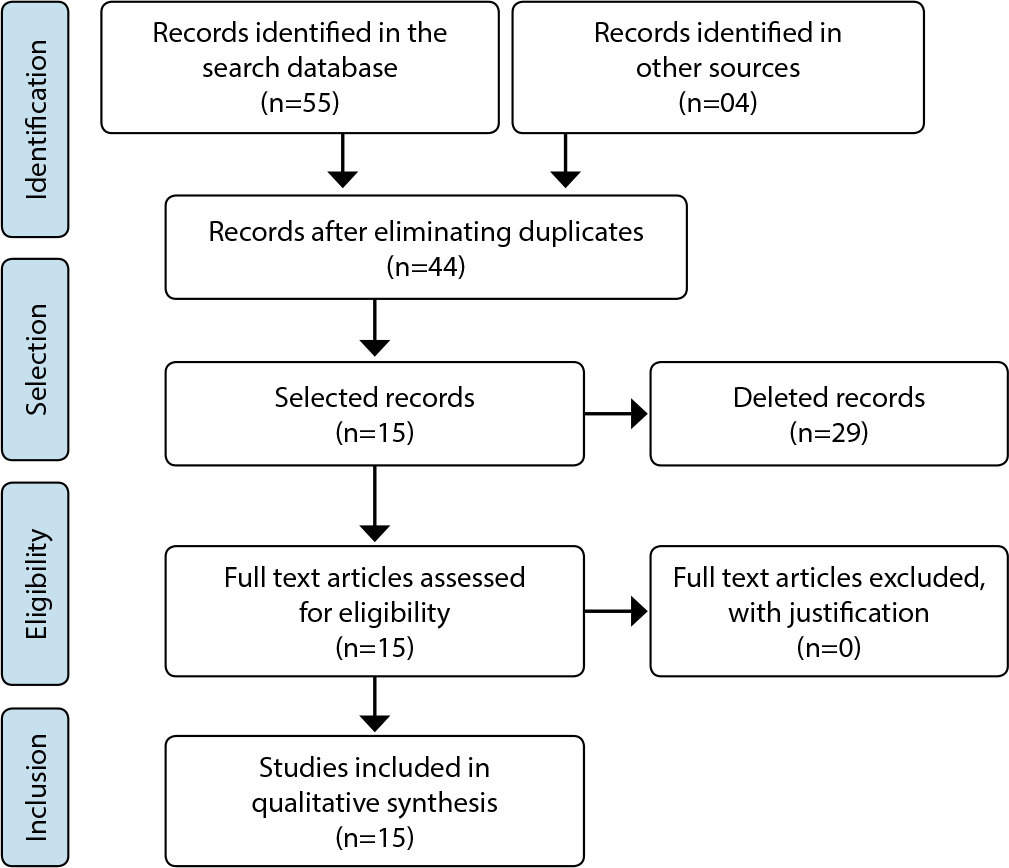
-
ORIGINAL ARTICLE11-19-2022
Stigma experienced by men diagnosed with COVID-19
Revista Brasileira de Enfermagem. 2022;75:e20210038
Abstract
ORIGINAL ARTICLEStigma experienced by men diagnosed with COVID-19
Revista Brasileira de Enfermagem. 2022;75:e20210038
DOI 10.1590/0034-7167-2021-0038
Views0See moreABSTRACT
Objective:
to analyze the stigma characteristics perceived in the experience of men who had COVID-19.
Method:
this qualitative study involved men living in Brazil, diagnosed with COVID-19, who answered semi-structured questions in an online form. Data were subjected to thematic and lexical analysis, interpreted in the light of the stigma theory.
Results:
92 men, adults, cisgender, heterosexual, of mixed race/color, belonging to middle class, living in the urban area, with higher education participated. The stigma characteristics evidenced were the occurrence of leave, perception of impolite treatment, use of labels and discrimination by co-workers, family members, neighbors and even healthcare professionals, with consequences for the psycho-emotional dimension.
Final considerations:
discrimination and exclusion derived from stigma surprised men marked by class and gender privileges, little used to being downgraded in interactions when compared to other groups.
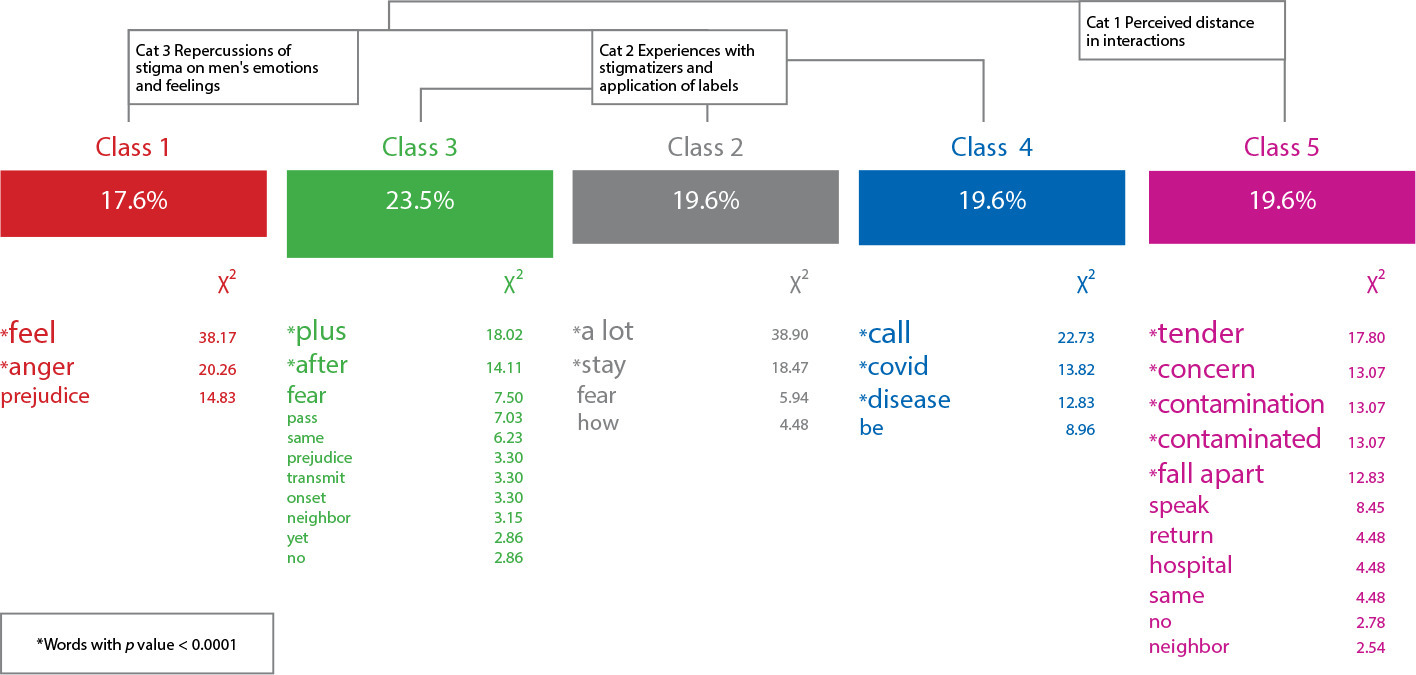
-
ORIGINAL ARTICLE11-15-2022
Suffering and defense mechanisms: an analysis of the work of Primary Health Care nurses
Revista Brasileira de Enfermagem. 2022;75:e20200419
Abstract
ORIGINAL ARTICLESuffering and defense mechanisms: an analysis of the work of Primary Health Care nurses
Revista Brasileira de Enfermagem. 2022;75:e20200419
DOI 10.1590/0034-7167-2020-0419
Views0See moreABSTRACT
Objective:
To analyze the suffering and coping strategies of nurses working in Primary Health Care considering the psychodynamics of their work.
Methods:
Descriptive study with a qualitative approach, carried out with 11 nurses working in Primary Health Care. Data were collected through semi-structured interviews, systematized, and interpreted using Bardin’s content analysis method applied to recurrent themes.
Results:
The suffering factors related to work in Primary Health Care are difficulties with management, the fragile structure of the health support network, and conflicts with the users. Defensive strategies to minimize these difficulties are the support of hierarchical superiors, the empowerment of the community and users, and communication between team members.
Final considerations:
It is important that there be changes in the organization of this line of work to improve the workers’ health.
-
RESEARCH01-01-2018
Assistance flowchart for pain management in a Neonatal Intensive Care Unit
Revista Brasileira de Enfermagem. 2018;71:1281-1289
Abstract
RESEARCHAssistance flowchart for pain management in a Neonatal Intensive Care Unit
Revista Brasileira de Enfermagem. 2018;71:1281-1289
DOI 10.1590/0034-7167-2017-0265
Views0See moreABSTRACT
Objective:
To describe and discuss the process of developing a flowchart collectively constructed by the health team of a Neonatal Intensive Care Unit for the management of neonatal pain.
Method:
This is a descriptive and an exploratory study with a qualitative approach that used Problem-Based Learning as a theoretical-methodological framework in the process of developing the assistance flowchart for the management of neonatal pain.
Results:
Based on this methodology, there was training in service and the discussion of key points of pain management by the health team, which served as input for the construction of the flowchart.
Final considerations:
The assistance flowchart for pain management, based on scientific evidence, provided means to facilitate the decision-making of the health team regarding the pain of the newborn. It is suggested to use the flowchart frequently to promote the permanent education of the team and identify possible points to be adjusted.

-
RESEARCH01-01-2018
The adolescent and the institutionalization: understanding the phenomenon and meanings attributed to it
Revista Brasileira de Enfermagem. 2018;71:1373-1380
Abstract
RESEARCHThe adolescent and the institutionalization: understanding the phenomenon and meanings attributed to it
Revista Brasileira de Enfermagem. 2018;71:1373-1380
DOI 10.1590/0034-7167-2017-0242
Views1See moreABSTRACT
Objective:
To understand the meaning of being institutionalized and in conflict with the law for the institutionalized adolescent.
Method:
A qualitative, phenomenological-comprehensive study carried out in a Socio-educational Service Foundation in the northern region of Brazil, with 05 institutionalized adolescents. The analysis was carried out under the understanding of the content suggested by Heidgger, thus allowing the construction of analytical categories for a hermeneutical interpretation.
Results:
Conflicting with the law means something negative and bad for the institutionalized adolescents, in which they understand that although there is deprivation of liberty, the period of hospitalization is an important moment for the reflection on the need to start over.
Conclusion:
The meaning of conflicting with the law goes far beyond a simple word, act or behaviour, it is something that only those who experience the phenomenon are able to unveil, arouse deep feelings and provide reflection to the adolescent about the damages caused by the infraction.
-
RESEARCH01-01-2018
Identification of post-cesarean surgical site infection: nursing consultation
Revista Brasileira de Enfermagem. 2018;71:1395-1403
Abstract
RESEARCHIdentification of post-cesarean surgical site infection: nursing consultation
Revista Brasileira de Enfermagem. 2018;71:1395-1403
DOI 10.1590/0034-7167-2017-0325
Views0See moreABSTRACT
Objective:
To describe the profile of women in relation to their living conditions, health status and socio-demographic profile, correlating it with the presence of signs and symptoms suggestive of post-cesarean surgical site infection, identifying information to be considered in the puerperium consultation performed by nurses and proposing a roadmap for the systematization of care.
Method:
Quantitative, exploratory, descriptive, cross-sectional and retrospective review of medical records of women who had cesarean deliveries in 2014, in the city of São Paulo.
Results:
89 medical records were analyzed, 62 of them with incomplete information. In 11, there was at least one of the signs and symptoms suggestive of infection.
Conclusion:
Given the results of the study, the systematization of puerperal consultation is essential. The roadmap is an instrument that can potentially improve the quality of service and the recording of information.
-
RESEARCH01-01-2018
Nursing laboratory and critical education of nurses: approaches and distances
Revista Brasileira de Enfermagem. 2018;71:1500-1506
Abstract
RESEARCHNursing laboratory and critical education of nurses: approaches and distances
Revista Brasileira de Enfermagem. 2018;71:1500-1506
DOI 10.1590/0034-7167-2017-0339
Views1See moreABSTRACT
Objective:
to analyze the contribution of the laboratory of nursing to the critical education of nurses.
Method:
qualitative study, conducted among 18 professors of higher education institutions, being one public and the other private. Data were collected between February and November of 2016 by means of semi-structured interview. To analyze data, it was used a content analysis in the thematic modality.
Results:
it was observed the emphasis in the technical skills development by propagation of behavior and practices; the creation of bonds between professors and students happens on the limit of good interpersonal relationship; the laboratory of nursing may help the critical reflection about the practice, being a place that allows the learning of ethics.
Final considerations:
the nurse education, carried out by the laboratory of nursing, have to overcome the emphasis in the uncritical reproduction of practices and to observe the nurse’s power to think about the reality in the meaning of its modification.
-
RESEARCH01-01-2018
Introduction of the School Health Program in the city of Cascavel, Paraná State: report of nurses
Revista Brasileira de Enfermagem. 2018;71:1540-1547
Abstract
RESEARCHIntroduction of the School Health Program in the city of Cascavel, Paraná State: report of nurses
Revista Brasileira de Enfermagem. 2018;71:1540-1547
DOI 10.1590/0034-7167-2017-0188
Views1See moreABSTRACT
Objective:
to understand the introduction of the School Health Program in the city of Cascavel, Paraná State, as opposed to the report of nurses.
Method:
a qualitative study with fifteen participants. The data were collected from April to August 2015, through semi-structured interviews, analyzed by content analysis and thematic modality.
Results:
the category “Introduction process” of the School Health Program integrates the subcategories “Identified health problems” and the “Challenges of intersectoriality”. The program was implemented quickly, with a fragile training of professionals to perform in the phases that compose it. Structural conditions of schools, human and material resources, and emerging intersectoral interaction were identified obstacles. The integration of the health, school, and family constitutes the program’s potentiality.
Final considerations:
it is understood that the actions of the program were based on health assessments of students, and it is necessary for professionals and managers to discuss and analyze the obstacles identified to achieve all the proposed objectives.
-
RESEARCH01-01-2018
Knowledge about precautions in Primary Health Care: tool validation
Revista Brasileira de Enfermagem. 2018;71:1589-1595
Abstract
RESEARCHKnowledge about precautions in Primary Health Care: tool validation
Revista Brasileira de Enfermagem. 2018;71:1589-1595
DOI 10.1590/0034-7167-2017-0886
Views0See moreABSTRACT
Objective:
To elaborate and validate a tool to assess knowledge and behavior of nursing professionals about standards and specific precautions in the Primary Health Care.
Method:
Methodological study of the elaboration and validation of the tool by thirteen experts judges, using a Likert scale of 4 points, with Content Validity Index ≥ 0.80, on clarity, relevance and pertinence.
Results:
A tool composed of 47 dichotomous questions to assess knowledge and 12 questions, with five options of answers, for the referred behavior. In the validation, only one item was deleted, related to the “Hands Hygiene” axis and one item was reformulated, regarding “Use of Common Gloves” and another 11 changed writing. The tool as a whole was assessed for relevance, comprehensiveness and representativeness within the scope of the topic investigated.
Conclusion:
The developed tool has been validated and is now available for use in Primary Health Care.
-
RESEARCH01-01-2018
Training in diabetes education: meanings attributed by primary care nurses
Revista Brasileira de Enfermagem. 2018;71:1611-1618
Abstract
RESEARCHTraining in diabetes education: meanings attributed by primary care nurses
Revista Brasileira de Enfermagem. 2018;71:1611-1618
DOI 10.1590/0034-7167-2017-0792
Views1See moreABSTRACT
Objective:
seize meanings attributed by primary care nurses to training in diabetes education.
Method:
exploratory and descriptive study, with a qualitative approach, with twenty primary care nurses; semistructured interview script, with interviews processed in the IRaMuTeQ software and analyzed through the Descending Hierarchical Classification. The results were subsidized in the Representational Theory of Meaning.
Results:
nurse training in diabetes education is insufficient for holistic action, although it allows the community to be instrumentalized in specific issues about the disease, using the limited tools available, especially lectures. Nurses find themselves in a context of challenges, improvisations, weaknesses, and limitations that determine the meaning attributed to diabetes education and subsequent actions.
Conclusion:
the meanings attributed by the nurses revealed an incipient training, which limits the quality of care provided and instigates the search for qualification.

-
RESEARCH01-01-2018
Nursing international student mobility in the University of São Paulo
Revista Brasileira de Enfermagem. 2018;71:1619-1625
Abstract
RESEARCHNursing international student mobility in the University of São Paulo
Revista Brasileira de Enfermagem. 2018;71:1619-1625
DOI 10.1590/0034-7167-2017-0754
Views1See moreABSTRACT
Objective:
To characterize the experiences of undergraduate students of the School of Nursing of the University of São Paulo (EEUSP) who participated in international mobility programs between January 2011 and July 2017.
Method:
Exploratory, descriptive study with quantitative approach. Of 68 reports, only 38 (56%) were considered valid and were submitted to descriptive statistical analysis. Data were categorized in general, institutional, academic and cultural aspects and cost of living.
Results:
The main destination was Portugal and the years with most participation were 2012 and 2013. The mean stay was six months and the students took a mean of three to four courses. The main funder was the university of origin.
Conclusion:
Academic activities were limited to theoretical and practical courses, with little insertion in research. There is a need to increase investment in learning other languages and to expand partnerships with larger centers of foreign education and research.
-
08-19-2019
Institutional strategies to prevent violence in nursing work: an integrative review
Revista Brasileira de Enfermagem. 2019;72(4):1052-1060
Abstract
Institutional strategies to prevent violence in nursing work: an integrative review
Revista Brasileira de Enfermagem. 2019;72(4):1052-1060
DOI 10.1590/0034-7167-2018-0687
Views0See moreABSTRACT
Objective:
To analyze the production of research that adopted as object of investigation: institutional strategies, actions and programs to curb and/or prevent the nursing workplace violence.
Method:
Integrative review of 14 articles in full, available in the databases LILACS, PubMed Central, Scopus, CINAHL and Web of Science.
Results:
Of the articles analyzed, most arise from quantitative research (71%), carried out in the United States (65%), with educational actions (57%) and programs (43%), denoting policies.
Conclusion:
Results showed various ways to curb or prevent nursing workplace violence. These are specific strategies, there are few programs deployed worldwide, usually centered in the United States, Canada and Sweden. Most of them is well evaluated and can serve as a model for the development and dissemination of policies according to the needs of each location.
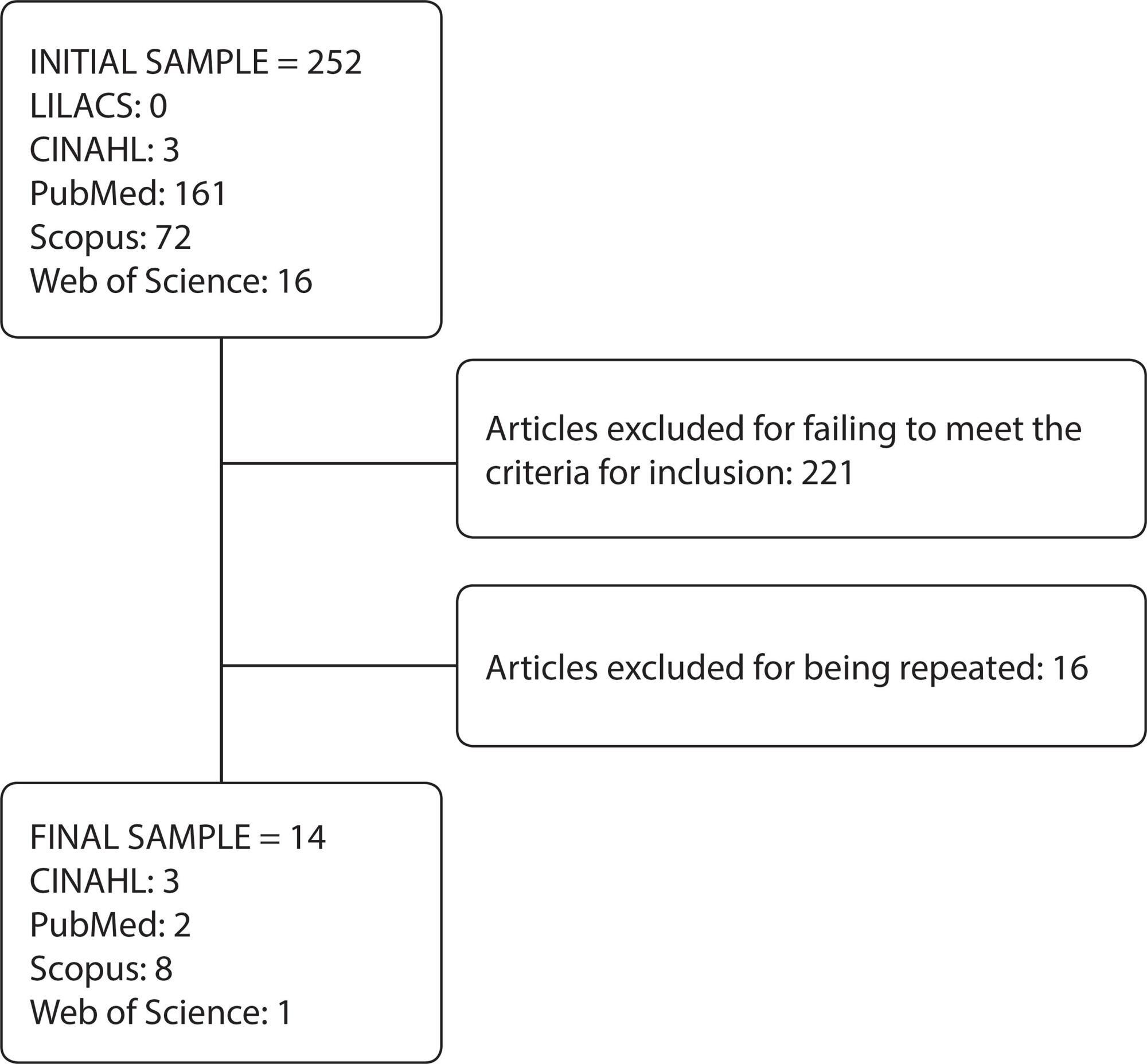
-
08-19-2019
Professional education on dementias in Primary Health Care: an integrative review
Revista Brasileira de Enfermagem. 2019;72(4):1086-1093
Abstract
Professional education on dementias in Primary Health Care: an integrative review
Revista Brasileira de Enfermagem. 2019;72(4):1086-1093
DOI 10.1590/0034-7167-2018-0652
Views0See moreABSTRACT
Objective:
To investigate the most commonly used educational approaches in dementia training for primary health care professionals.
Method:
Integrative literature review, conducted between April and June of 2018, in PubMed, LILACS and IBECS databases. The descriptors used were: Training, Health Personnel, Dementia, Primary Health Care for PubMed; and the MeSH terms, Training Programs, Health Personnel, Dementia, and Primary Health Care for LILACS and IBECS.
Results:
The sample consisted of 13 articles; eight were published in the last five years (62%); seven articles with a quantitative approach (54%); seven articles produced on the European continent (54%), followed by five published on the North American continent (38%). All journals were from the health area (100%).
Conclusion:
Educational strategies were combined and used for education. Significant improvements in knowledge, skills, and attitudes of the teams with regard to professional management of dementias were evidenced.

-
ORIGINAL ARTICLE12-05-2019
Factors associated with metabolic syndrome in older adults: a population-based study
Revista Brasileira de Enfermagem. 2019;72:221-228
Abstract
ORIGINAL ARTICLEFactors associated with metabolic syndrome in older adults: a population-based study
Revista Brasileira de Enfermagem. 2019;72:221-228
DOI 10.1590/0034-7167-2018-0620
Views0See moreABSTRACT
Objective:
To estimate the prevalence of the metabolic syndrome and clusters of its components and to identify possible associated factors in older adults.
Method:
Cross-sectional and population-based study, involving 271 older people. We collected sociodemographic, behavioral, clinical, biochemical, and anthropometric data. Data were analyzed by descriptive and logistic regression techniques.
Results:
The prevalence of metabolic syndrome was 59% and was associated with women, overweight/obesity, and the C-reactive protein. Concerning the clusters, 11.4% of the sample had all the components of the metabolic syndrome, and only 5.2% of individuals did not have any of its components.
Conclusion:
We found there is a high prevalence of metabolic syndrome and clusters of its components in older adults. It is important to deepen studies on this matter, considering clinical aspects in relation to sex and healthy behavioral habits for creating public policies as well as emphasizing actions aimed at promoting self-care in all cycles of life.

-
ORIGINAL ARTICLE02-10-2020
Common mental disorders in nursing students of the professionalizing cycle
Revista Brasileira de Enfermagem. 2020;73(1):e20180154
Abstract
ORIGINAL ARTICLECommon mental disorders in nursing students of the professionalizing cycle
Revista Brasileira de Enfermagem. 2020;73(1):e20180154
DOI 10.1590/0034-7167-2018-0154
Views0See moreABSTRACT
Objectives:
to verify the suspicion of common mental disorders in nursing students of the professionalizing cycle and the association with sociodemographic features.
Method:
cross-sectional study with a sample of 85 students from a public university in the state of Rio de Janeiro (RJ) who responded to the Self-Report Questionnaire-20 and sociodemographic questions.
Results:
the suspicion prevalence of common mental disorders (CMD) in the sample was 55.3% and it was identified the association with the consumption of alcohol. Of the most frequent SRQ-20 complaints, 95.3% reported “feeling nervous, tense or worried”, 72.9% “having difficulty making decisions”, 60% “sleeping poorly” and 37.6% “having lost interest by things “.
Conclusion:
high prevalence of CMD in the sample and the association with the consumption of alcohol requires preventive and therapeutic actions among the students that minimize the possibility of severe mental disorders related to the consumption of alcohol and other drugs.
-
REVIEW07-13-2020
Prevention and control measures for neonatal COVID-19 infection: a scoping review
Revista Brasileira de Enfermagem. 2020;73:e20200467
Abstract
REVIEWPrevention and control measures for neonatal COVID-19 infection: a scoping review
Revista Brasileira de Enfermagem. 2020;73:e20200467
DOI 10.1590/0034-7167-2020-0467
Views0See moreABSTRACT
Objective:
to identify with the literature the measures to prevent and control neonatal infection by COVID-19.
Methods:
a scope review carried out by searching for studies in databases and institutional health websites. The final sample was 25 articles.
Results:
among the main measures are the use of masks by suspected or infected people in contact with healthy newborns, hand hygiene before and after each care and feeding as well as the tools used for milking. It is indispensable to use personal protective equipment by health professionals in neonatology services to maintain a private room for infected newborns or to use physical barriers. Early diagnosis and timely case management is essential to reduce virus transmissibility.
Conclusions:
the research contributed to elucidate health and nursing actions in preventing and controlling neonatal infection by COVID-19.

-
ORIGINAL ARTICLE06-27-2019
Insertion of central vascular catheter: adherence to infection prevention bundle
Revista Brasileira de Enfermagem. 2019;72(3):774-779
Abstract
ORIGINAL ARTICLEInsertion of central vascular catheter: adherence to infection prevention bundle
Revista Brasileira de Enfermagem. 2019;72(3):774-779
DOI 10.1590/0034-7167-2018-0124
Views0See moreABSTRACT
Objective:
To evaluate the compliance of the care process involving insertion of central vascular catheter (CVC) in hemodialysis.
Method:
Cross-sectional quantitative approach developed at the hemodialysis service of a reference hospital in Sergipe, Brazil. Sample consisting of 1,342 actions evaluated, corresponding to 122 forms for monitoring and control of CVC insertion. Data collection was held from July to December 2016.
Results:
The adherence rate to the use of the insertion form was 54.9%. The procedure evaluated achieved 93% overall compliance. Of the 11 specific actions observed, seven (64%) presented 100% compliance. The density of the overall incidence of primary bloodstream infections reduced from 10.6 to 3.1 infections per 1,000 patients/day.
Conclusion:
Although the observed actions reached specific desired conformities, the use of the checklist was lower than expected. Strategies for monitoring, coaching and educational and organizational actions can contribute to safe care.
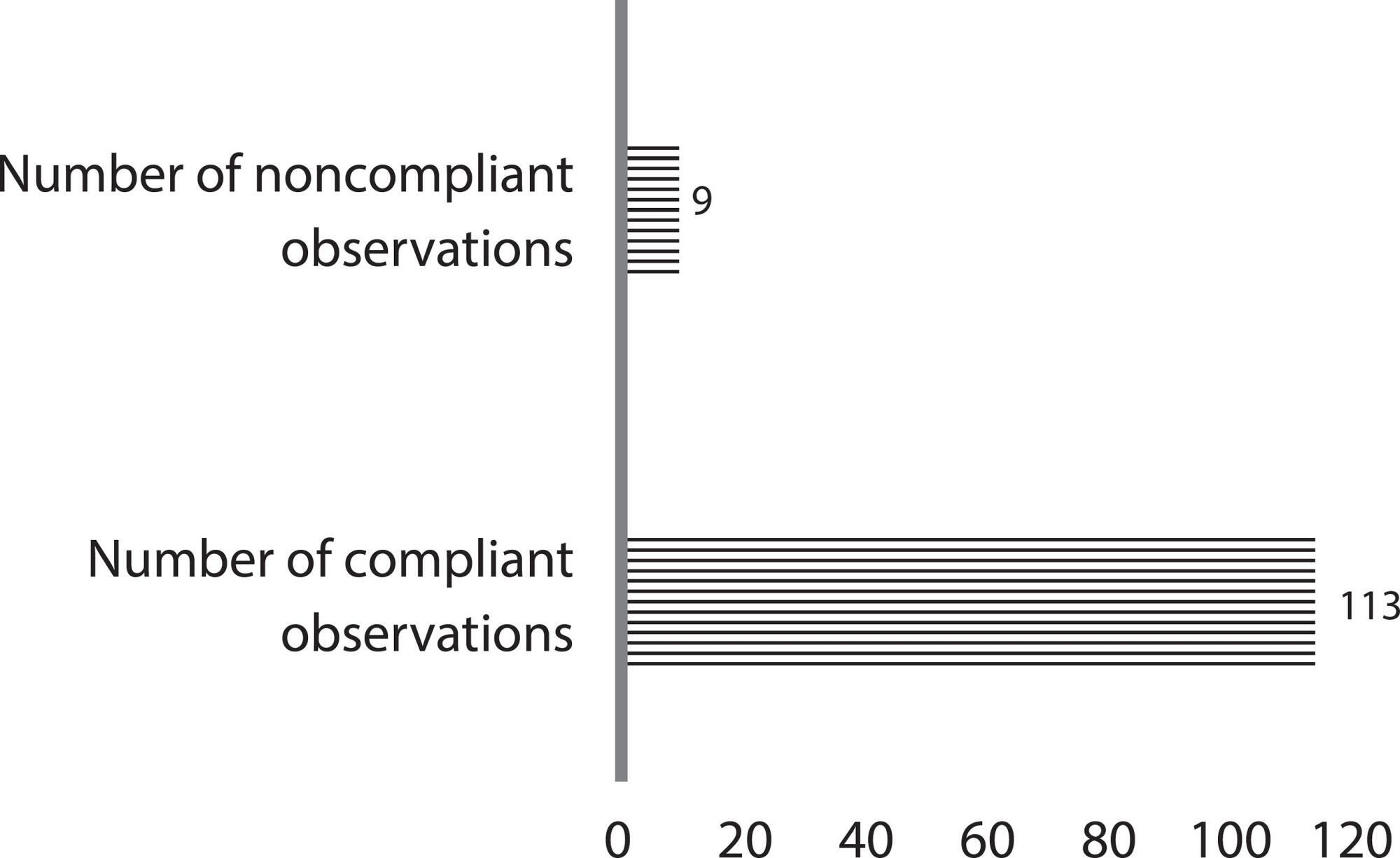
-
REVIEW06-17-2020
Prevention and conduct against the Extravasation of antineoplastic chemotherapy: a scoping review
Revista Brasileira de Enfermagem. 2020;73(4):e20190008
Abstract
REVIEWPrevention and conduct against the Extravasation of antineoplastic chemotherapy: a scoping review
Revista Brasileira de Enfermagem. 2020;73(4):e20190008
DOI 10.1590/0034-7167-2019-0008
Views0See moreABSTRACT
Objectives:
to identify and synthesize scientific evidence on prevention and management of extravasation of antineoplastic agents in adult patients by nurses.
Methods:
scoping review, according to Joanna Briggs Institute and PRISMA-ScR. Research was conducted in five electronic databases, Cochrane Library and eight catalogs of theses and dissertations. Data collection occurred from April to July 2018, with no time limit. The extracted data were analyzed and synthesized in a narrative way.
Results:
a total of 3,110 records were retrieved and 18 studies were kept for review. Most publications (66.6%) had a qualitative approach and addressed both aspects, i.e., prevention and management of extravasation of chemotherapy in adult patients.
Conclusions:
the implementation of protocols based on scientific evidence on prevention and management of extravasation of antineoplastic agents is paramount in order to provide patient safety and support to the nursing staff.
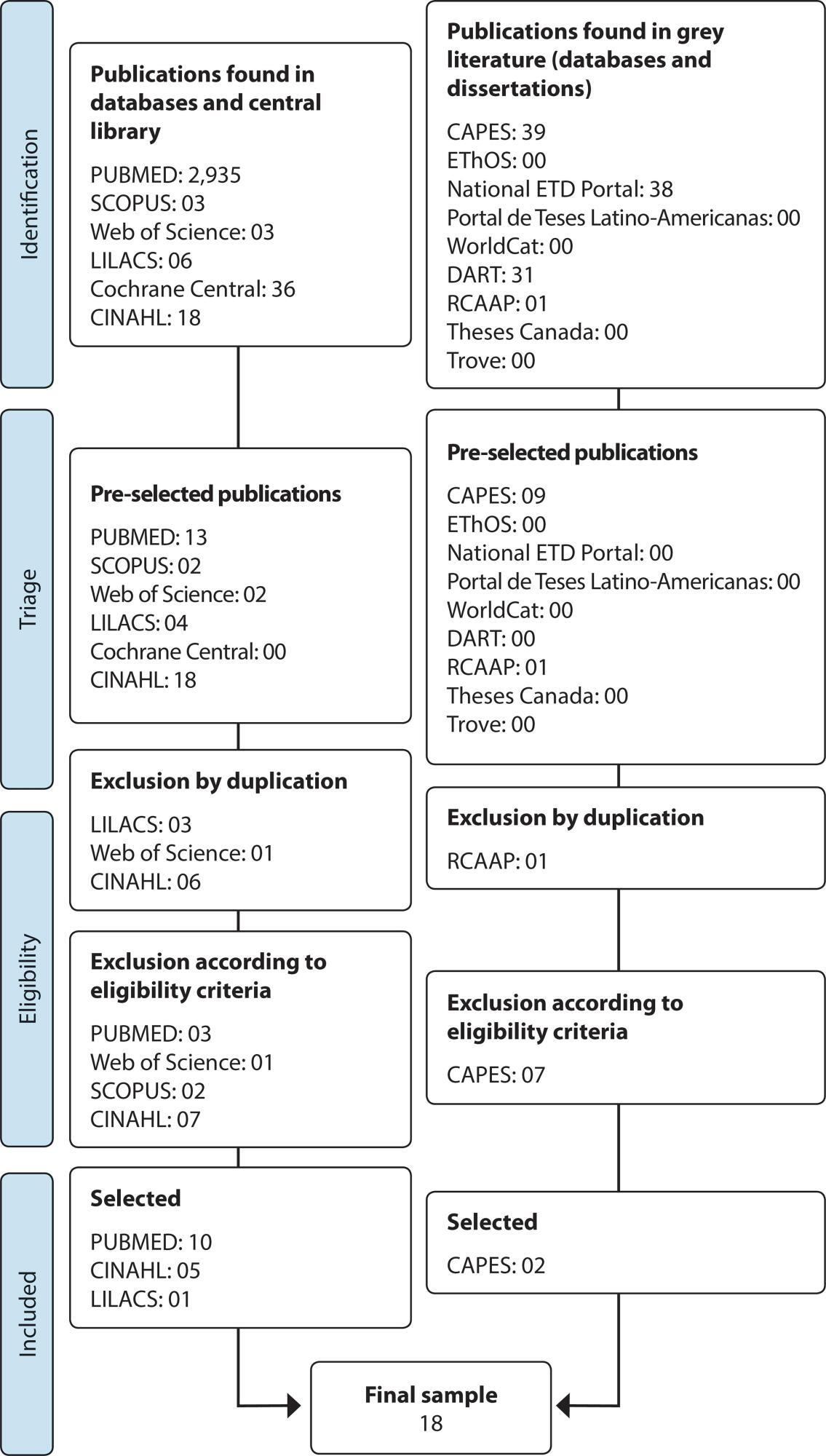
-
ORIGINAL ARTICLE12-05-2019
Functional health literacy in hypertensive elders at primary health care
Revista Brasileira de Enfermagem. 2019;72:266-273
Abstract
ORIGINAL ARTICLEFunctional health literacy in hypertensive elders at primary health care
Revista Brasileira de Enfermagem. 2019;72:266-273
DOI 10.1590/0034-7167-2018-0897
Views0See moreABSTRACT
Objective:
to assess the relationship between inadequate functional health literacy and inadequate blood pressure control in older people with hypertension in Primary Health Care.
Method:
a cross-sectional study with sample calculated at 392. SAHLPA-18 tool was used for functional health literacy; blood pressure was measured; sociodemographic and clinical data were collected. Hierarchical logistic regression was used.
Results:
(high) inadequate blood pressure and (low) functional inadequate health literacy were present in 41.6% and 54.6% of the people, respectively. Factors associated with inadequate blood pressure were: inadequate functional health literacy, black-brown skin color, overweight-obesity, hypertension diagnosis time, non-adherence to exercise/diet, drug treatment. Schooling had no association with inadequate blood pressure
Conclusion:
hypertensive elderly people with inadequate health literacy were more likely to have inadequate blood pressure. Thus, health professionals need to value functional health literacy as a possible component to control blood pressure.
Search
Search in:
Nuvem de Tags
Adolescente (85) Atenção Primária à Saúde (239) COVID-19 (91) Criança (91) Cuidados de Enfermagem (269) Educação em Enfermagem (151) Educação em Saúde (139) Enfermagem (930) Enfermagem Pediátrica (86) Estudantes de Enfermagem (77) Estudos de Validação (131) Família (87) Idoso (208) Promoção da Saúde (99) Qualidade de Vida (104) Saúde do Trabalhador (86) Saúde Mental (145) Saúde Pública (82) Segurança do Paciente (150) Tecnologia Educacional (100)



